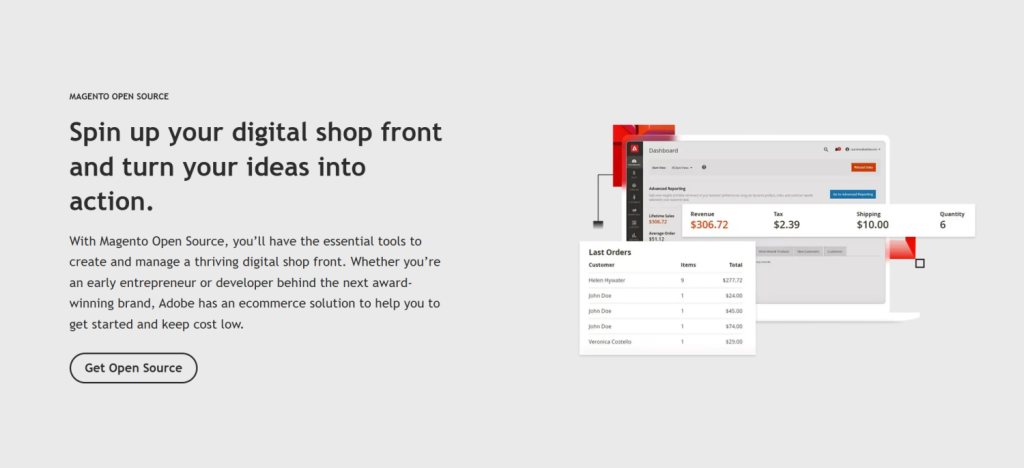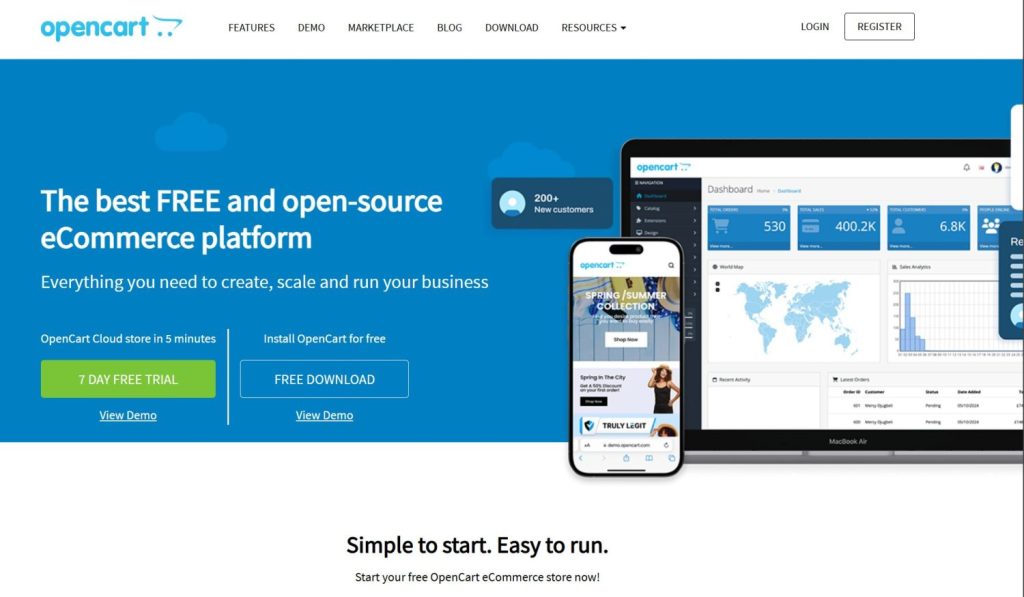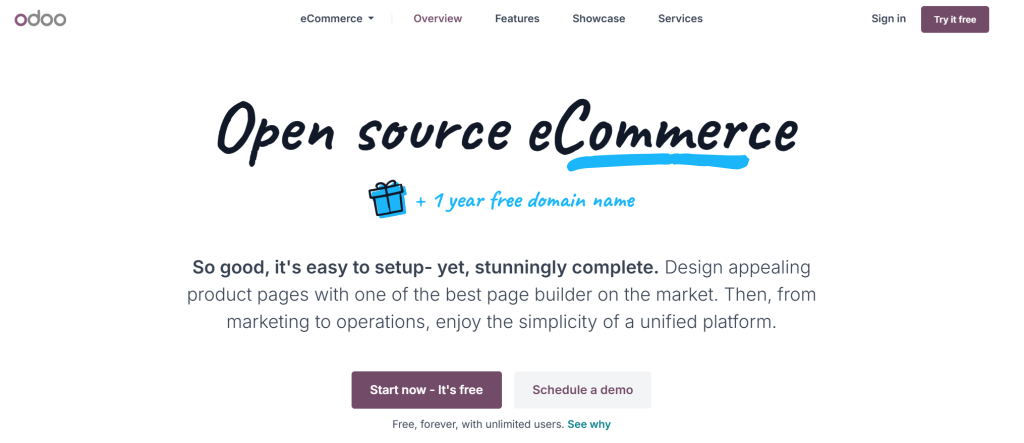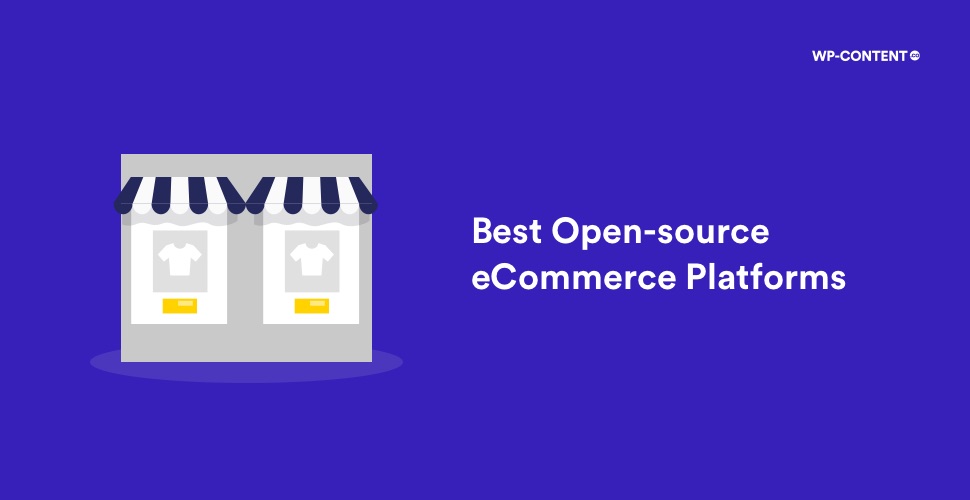When you are running a business, its growth, expansion, and revenue will be determined by one major factor – the customers. The larger the customer base, the greater the sales, profits, and other prospects. The problem here is, how can you tap into the large pool of potential customers out there? How can you let them know of your products and services?
This is where having an e-commerce presence is useful. Ask yourself, do you want to stay limited to the local market or expand globally? But the question that every business owners have before going online is whether they will have full control over the digital marketplace or not. The answer is Yes. With open-source eCommerce platforms, you can control every single aspect.
We explore the top open-source eCommerce platforms and why you should take your business online.
What is an Open-source eCommerce platform?
As the name suggests, open-source eCommerce platforms are where the users have full access to the source code. This means that you can tweak the online eCommerce platform to your liking and not feel constrained. You can control each and every aspect including:
- Determine the look and feel of your eCommerce website without any limitations
- Control the products and their listing layout indefinitely
- Unlimited integration options
- Use a wide variety of tools
By going with an open-source eCommerce platform, you will never feel constrained and will always have full control.
Things to Know When Opting for the Open-source eCommerce Platform Route
Before you jump in, you need to know a bit more details before finalizing to go with an open-source platform. Once you have decided upon which eCommerce platform you are going with, you need to also consider the pricing for the hosting and also for the development side, unless you are developing it yourself.
You need to pick a good hosting provider, then have a team of developers work on the open-source code and also have them maintain the website for updates and security improvements. Some open-source eCommerce platforms offer both hosted and self-hosting options to choose from.
The biggest concern with an open-source platform is always the security aspect. Everything from user credentials to personal data, payment-related security measures, and so on is your responsibility. This has to be picture-perfect during the development stage as even the tiniest of unoptimized code can lead to data leaks and outside intrusions. Also, ensuring your website adheres to user data protection laws is of utmost importance.
Next comes customer support and the overall maintenance of your website. For example, if a page is unavailable or the payment gateway is not working, then your technical team has to solve it and you cannot expect any support from anywhere else. So if you don’t have a technical team that works 24×7, then the user experience will be affected.
If all these seem too much work for you, then opting for a SaaS platform will be better. But remember that the freedom you will have in a SaaS platform will be limited.
Also read: Where to Get Your Domain Name From?
The Top Open-source eCommerce Platforms
Your business is a like a seed, once it is planted it will grow and spread. The only way you will achieve the growth phase is when your business and service reach a larger community. By taking your business online, you are making yourself visible to potential customers from all over the globe.
The top open-source eCommerce platforms to choose from are:
1. WooCommerce
Whether it is to sell products online or to build an online store for your clients, WooCommerce can do it all. Now as you have guessed, the WooCommerce plugin goes hand in hand with WordPress. Building an online store with WooCommerce is an easy process and offers all the flexibility you will ever want and wished for.
You can customize your online store to any extent you want, you can incorporate as many plugins and tools as you want, and also make use of multiple payment gateways. WooCommerce is also updated regularly so to improve its performance as well as to tackle any security concerns. Make sure you choose a fast and reliable WordPress hosting provider.
Also read: 6 Free Tools to Install WordPress Locally
2. Magento Open Source

Magento open-source version is still available to users, even though the platform was bought by Adobe back in 2018. Magento is very well known among users and needs no special introduction about its features and customizability.
Users can make use of the various Magento add-ons from their marketplace. If users require more features then they can make use of the premium version which is known as Adobe Commerce.
3. CubeCart
CubeCart eCommerce platform offers a lot of features to its users. It is licensed under GPL 3.0 and offers the users either to self-host the source code or make use of their own hosting. If you opt for their hosting, you get a 14-day trial period, instant setup, and technical support. They have three hosting plans and they are Unmanaged priced at $33/month, Managed priced at $53/month and Managed priced at $79/month.
The features that CubeCart offers include unlimited customers, orders, products, categories, statistics, coupons/vouchers, catalog import and export, and so on. CubeCart is 100% template-driven responsive skin and uses the Smart Template Engine.
4. Solidus
Solidus is an open-source eCommerce platform that is powered by Ruby on Rails and is 100% free. There is no limitation and the users are free to make their own changes and the platform is highly scalable. There are no hidden charges or revenue sharing or anything else, the platform is absolutely free.
Solidus is also secure as there are regular security updates and code reviews. Solidus is developed and supported by the open-source community and the entire roadmap is visible to the public. All the features from the product catalog, inventory management, ability to create a headless eCommerce platform with RESTful or GraphQL API, tax calculations, multiple payment integrations, and many more.
5. nopCommerce
nopCommerce is an ASP.NET Core based eCommerce platform that is open source and also PCI DSS compliant. nopCommerce supports over 1500+ integrations and has an active community of over 250,000 members.
The features offered include multi-vendor support, multi-store, Omni channel eCommerce support, the ability to develop a headless eCommerce platform, SEO optimizations, and many more. nopCommerce is suitable for all types of businesses, from small to global-level businesses.
One must pay $250 to get the copyright removal key to remove “Powered by nopCommerce” from their website footer. Users can download either the package with the source code or download only the package if you want to deploy your store immediately.
Also read: Stunning Free Stock Photos Websites You Must Know
6. OpenCart

OpenCat powers over 470K eCommerce sites all over the world and is an eCommerce platform that is written in PHP. The platform is free to use, provides regular updates and there are over 13000+ themes and more to choose from their marketplace. With OpenCart you get both community-based and dedicated support. For community support, they have their own forum and for dedicated support, they have four plans that one can choose from.
With OpenCart you have a fully functional administration dashboard, user management features, multi-store ability, mobile, and SEO-friendly adaptability, guest and registered user checkout, and many more features.
With OpenCart also you can either go with self-hosting or go with their own hosting which uses A2 hosting as its partner.
7. osCommerce
osCommerce is a full free open-source eCommerce platform written in PHP. They have an active forum to help you out with any issues that you may face. osCommerce offers users two options, either to self-host the platform or make use of osCommerce hosting.
osCommerce has over 20+ years of experience in the eCommerce field and its marketplace is a clear reflection of this. One can almost all the needed tools there, right from design to marketing to SEO and more.
8. Saleor
Saleor is an open-source headless eCommerce platform that gives users full freedom in all aspects. Saleor can be integrated with the user’s preferred CMS, CRM, and Saleor offer both open source as well as a cloud platform for its users.
Saleor makes use of Django 2, GraphQL, and Python 3. Saleor can be scaled as and when your business grows and being open source it is fully customizable. Saleor also comes with a fully-fledged management dashboard.
Also read: Best A/B Testing Tools For WordPress
9. Medusa
Medusa puts a strong proposition to the table and that is they describe themselves as the “Open-source Shopify alternative”. Medusa is a completely free eCommerce platform that can be initiated in minutes. Medusa supports headless API, integration with almost all the leading tools out there, customization, and scalability as your business grows.
The user can control everything from the currencies, to the payment methods, and tax from one admin panel for local stores and other sales channels. The users have the ability to import and export the products or even the customer base. Bgaisto is completely free to use, but they also have a premium support version to help users out with any problems they may face.
10. Bagisto
Bagisto is an eCommerce platform that is built using Laravel and is absolutely free. This eCommerce platform offers a lot of features and is actively developed and maintained by the community.
The features offered by Bagisto include the ability to sell on multiple channels, create customer groups, integrate with multiple payment methods, custom attributes to the product listing, analytics reports, multi-currency support, product SEO, core web vitals, search by image, and many more. They also have an extension marketplace to further enrich its features. They also have a dedicated forum to report bugs and for general discussion.
11. Odoo eCommerce

Odoo does provide an eCommerce platform besides its other offerings. Its eCommerce platform is open source and scalable. The best part is that the hosting is free forever and they pay for your domain for the first year. But they will charge for the extra add-ons you add such as accounting and inventory.
They offer a drag-and-drop builder, B2B ability, live chat features, contact forms, coupons, promotions, ability to run multiple stores. Lead generations, tax rates, and many more features to make your eCommerce website complete.
12. PrestaShop
PrestaShop is another self-hosted eCommerce platform that gives its users the freedom to customize it fully. PrestaShop offers a lot of add-ons from themes to tools. But keep in mind that the pricing is a bit on the higher side. PrestaShop provides a free SSL certificate and also supports multiple payment gateway integrations. Other features include email marketing, coupon vouchers, and so on.
There are a lot of integration options available, but they require to use of add-ons which is a premium service. PrestaShop offers both self-hosting options as well as their in-house hosting option which starts at 450 €/month.
13. CS-Cart
CS-Cart is an open-source eCommerce platform that is available in three versions. They are Professional, Multi-vendor, and Community. Depending on the need, the users can choose which one to opt for. All three of them are open source so the users have full control over their eCommerce stores.
They have a total of 6 paid plans under two categories, No-code and On-premises. CS-Cart is PCI DSS Compliant and the source code undergoes regular pen testing and other tests to iron out any vulnerabilities that exist.
Also read: The Best CDN Services For WordPress
14. Zen Cart
Zen Cart is a completely free-to-use eCommerce platform. This is a platform that is not known to many, but it does offer the same features as the rest. The platform is customizable, with multiple payment integration options. Zen Cart as of now only supports self-hosting and works with the majority of the web hosting service providers.
Zen Cart has its own plugin collection for various categories, but compared to others the total number of available plugins is limited.
15. Spree Commerce
Spree Commerce is a headless open-source eCommerce platform that supports B2C and B2B eCommerce. Spree Commerce uses Ruby on Rails as its foundation. Spree Commerce supports almost all the languages and currencies out there, has the ability to integrate with any payment and shipping method, and allows for all the major third-party integrations.
Spree Commerce is also accessibility focused and provides transaction emails that are customizable. React and Vue storefront options are also available. It also includes various Omni channels and international sales features and also includes various marketing features and analytics tools.
16. Shopware

Shopware is a headless eCommerce that focuses not just on customization but also on performance and agility. Shopware is ideal for both B2C and B2B and is highly scalable on the go. Shopware offers a self-hosted option and a cloud-hosted model with full scalability. One can opt for either SaaS or PaaS.
There are plugins you can make use of, but the library is not vast like the competition. Other features include email templates, flow builder, rule builder, marketing tools, analytics reports, SEO optimization, and so on. Shopware offers both a free community version as well paid version.
Also read: Helpful Tools to Manage Multiple WordPress Sites From One Dashboard
17. Sylius
Sylius is an open-source headless eCommerce platform built on the Symfony full-stack framework. The targeted users are enterprise and mid-market brands. Sylius provides the users with unlimited scalability options, fully customizable, headless eCommerce and PWA ready, the ability to combine Sylius with other PIM and CRM, and more.
Sylius also offers a premium version that is charged annually which depends on the Gross Merchandise Volume. Sylius plus adds more features that some users may find beneficial like a loyalty system, multi-source inventory, advanced user permissions, and more.
18. Drupal Commerce
Drupal commerce is a PHP-written open-source eCommerce platform that uses Drupal as the CMS. Drupal commerce offers various integration options such as Avalara, PayPal, Braintree, Lingotek, and many more. No need to worry about scalability, as you can make the needed changes as your business grows.
If needed you can also create a headless eCommerce and drupal commerce is also mobile-ready and has a really active community of developers and users.
Wrapping Up
Having an eCommerce presence is vital. With an eCommerce platform, you can reach more audiences, turn them into potential customers and increase your revenue.




I have read your blog on Open source eCommerce platform customization tips. It was very interesting and helpful but I can add some extra points in your article. Here some extra points:
1.Select your perfect ecommerce platform.
2.Purchase a domain name.
3.Find a developer.
4.Pick your ecommerce theme.
These are some extra points to add to your article. Readers if you are confused about your web and App development , you can get a free consultation at Alakmalak technologies.Visit our site for more information.